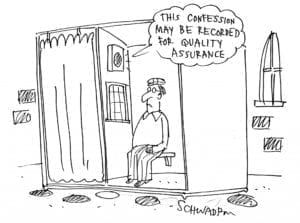Call recording storage is not something most providers often speak of. It is considered an inner working of their infrastructure and usually is not visible to the public eye. Yet it is important for YOU to know that your hosted system is provisioned to record and keep all the calls you want it to. One of the great benefits of switching your business telephony over to Hosted VoIP lies in just how easy hosted systems make call recording appear. In a hosted environment you don’t need to worry about hooking up dedicated call recording devices or converting physical audio files to bits and bytes after the fact. Hosted PBX systems let you automatically record and save a copy of every single call running through your organization’s communication channels without giving the process a second thought.
Well, that’s not really true. All those recorded calls must be mixed, encoded and then need to go somewhere. If your hosted VoIP service provider’s storage systems aren’t robust enough or you will never get to take advantage of the full benefits offered by persistent call recording. After all, the great benefit of persistent call recording lies within the ability to pull up calls made years ago with little more than the click of your mouse. And you can’t do that if you only have enough storage to hold on to calls made within the last six months.
It doesn’t take a lot of talking to convince our clients that persistent call recording is a good idea, especially when it comes to settling customer complaints and legal problems, but it often takes a couple extra minutes to convince them they may need to invest into optional upgrade their storage solutions.
There are two big factors you need to take into account here:
- The raw storage you need to save the resulting files. If you’re a medium sized company then you likely have at least one call on the line at any given moment of your business day. Let’s say your business is open a conservative eight hours a day and you wish to record each call of every person using your Hosted PBX. That means you need enough storage to save eight hours of audio files every day. Let’s bump the example up a notch and say you always have at least two phone calls on the line being recorded during all eight of your business hours. You now have sixteen hours of new audio files being saved to your storage solution every day. Every line in use saves additional hours of audio files every day to your storage solutions. The size of your files depends on the type of audio encoding that was chosen for your PBX system.
- The storage you need to successfully record multiple calls at one time. Not everyone is aware of the fact a storage drive does more than just hold on to the files you dump into it. Every one of your storage drives is also actively involved in encoding each call and writing the ensuing stream of data into a readable file. The more calls you have going at any one moment the greater the input/output load on your system’s processor and storage solutions. Every concurrent call going on within your organization at any given moment is a lot like every application running on your laptop right now. Run more applications than your laptop can handle and it will either choke and hang or you get the blue screen of death. Record more calls concurrently than your storage can write at once and your data solutions will meet a similar fate.
Hopefully by now you understand why it’s so important to make sure that your hosted VoIP service provider properly provisions the storage solution you need to take full advantage of your call recording services. Figuring out just how much storage you need can be pretty complicated because there are so many moving parts involved, so it’s best to consult with a telephony professional or your voip service provider before you set up your new VoIP system and call recording functionality.
